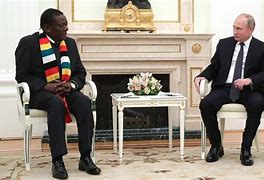Mnangagwa tells Putin US is ‘consolidating’ military bases in Zambia: Truth Or Bollocks?

PRESIDENTS: Mnangagwa and Putin
HARARE – The embattled Zimbabwean President Mnangagwa’s outreach to Russia and accusations against the United States by accusing it of consolidating its military strength in Zambia, highlight the growing rift between the neighboring nations.
Diplomatic relations between Zimbabwe and Zambia, historically marked by mutual support, have deteriorated under the leadership of President Emmerson Mnangagwa of Zimbabwe and President Hakainde Hichilema of Zambia.
During a meeting with Russian President Vladimir Putin on Thursday, President Mnangagwa sought assistance for “defense and food security,” expressing concerns about U.S. influence in Zambia. Mnangagwa claimed that the United States is “consolidating its power” in Zambia through increased security and financial aid, which he suggested aims to isolate Zimbabwe.
“The United States is making us feel lonely,” Mnangagwa remarked, indicating a perceived encirclement by Western powers.
Since President Hichilema assumed office, the United States has strengthened its ties with Zambia, offering increased financial aid and security cooperation.
@edmnangagwa SOS to Putin. We are lonely he says. Zambia-US relationship making us lonely 🤪 pic.twitter.com/3bmOv6Sz3K
— Gerrard Anko Ged Belts (@MacBelts) June 7, 2024
The establishment of a U.S. military base in Zambia has particularly signaled a shift in regional alliances. This closer relationship contrasts sharply with the more contentious U.S.-Zimbabwe relations, strained by ongoing sanctions and criticisms of Zimbabwe’s human rights record.
The Southern African Development Community (SADC) has also played a significant role in the unfolding drama. Former Zambian Vice President Nevers Mumba, leading the SADC Electoral Observation Mission to Zimbabwe, issued a critical report on Zimbabwe’s recent elections. The report highlighted irregularities and questioned the legitimacy of Mnangagwa’s victory, adding to the diplomatic tension.
Mnangagwa’s government dismissed the report as biased, accusing Mumba of exceeding his mandate. This disagreement has further strained relations, with Zimbabwe perceiving SADC, and by extension Zambia, as influenced by Western powers.
Zimbabwe’s political landscape remains volatile, with Mnangagwa’s administration facing allegations of corruption, human rights abuses, and election rigging. The SADC report, combined with increasing pressure from Western nations, has sparked fears of an orchestrated regime change. Mnangagwa’s government views the U.S.’s growing influence in Zambia and SADC’s critical stance as part of a broader strategy to undermine his rule.
Mnangagwa’s support for former Zambian President Edgar Lungu, succeeded by Hichilema, has also been contentious. Lungu, whose presidency was marred by accusations of authoritarianism and economic mismanagement, was a close ally of Mnangagwa. The transition to Hichilema, a reformist leader with strong international support, marked a significant shift in Zambia’s domestic and foreign policies.
Hichilema’s administration has distanced itself from Lungu’s legacy, focusing on anti-corruption measures and economic reforms. Mnangagwa perceives these policies as a threat to the regional status quo and his political survival.
Mnangagwa’s appeal to Putin for support in defense and food security underscores Zimbabwe’s precarious situation. The country faces numerous challenges, including economic instability, food shortages, and an underfunded military. Russia’s assistance is seen as crucial to bolstering Zimbabwe’s resilience against perceived external threats.
The request for defense support highlights Zimbabwe’s isolation within the region. With Zambia receiving increased security support from the U.S., Zimbabwe fears vulnerability. The appeal to Russia is an attempt to counterbalance U.S. influence and secure a reliable ally amid growing regional tensions.
Under the leadership of President Emmerson Mnangagwa and President Hakainde Hichilema, diplomatic relations between Zimbabwe and Zambia have become increasingly strained.
Mnangagwa’s appeal to Russia, accusations against the U.S., and support for former Zambian President Edgar Lungu reflect a broader geopolitical struggle in Southern Africa.
As the U.S. consolidates its influence in Zambia, Zimbabwe finds itself increasingly isolated, turning to Russia for support. The future of Zimbabwe-Zambia relations will depend on the evolving dynamics of international alliances, regional politics, and internal developments within both countries.







